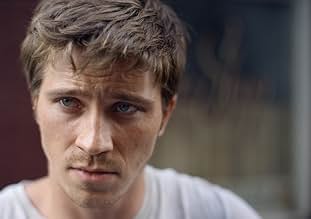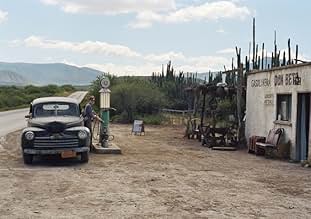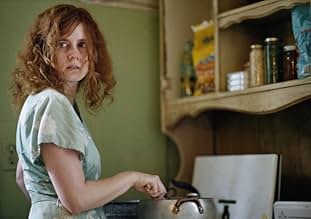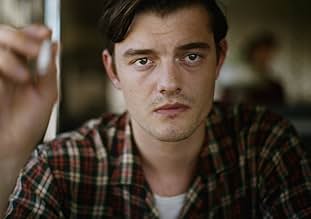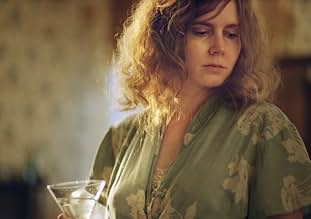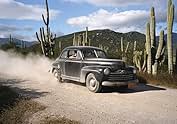La vita del giovane scrittore Sal Paradise viene sconvolta dall'arrivo di Dean Moriarty e della sua fidanzata Marylou, giovani spiriti liberi. Mano a mano che viaggiano per il Paese, incontr... Leggi tuttoLa vita del giovane scrittore Sal Paradise viene sconvolta dall'arrivo di Dean Moriarty e della sua fidanzata Marylou, giovani spiriti liberi. Mano a mano che viaggiano per il Paese, incontrano un mix di persone che influenzeranno indelebilmente il loro viaggio.La vita del giovane scrittore Sal Paradise viene sconvolta dall'arrivo di Dean Moriarty e della sua fidanzata Marylou, giovani spiriti liberi. Mano a mano che viaggiano per il Paese, incontrano un mix di persone che influenzeranno indelebilmente il loro viaggio.
- Premi
- 2 vittorie e 4 candidature totali
- Walter's Wife
- (as Tetchena Bellange)
Recensioni in evidenza
Making a film on such a book requires selection. Kerouac's hedonistic rampage across America, as selected by director Walter Salles, looks more mindless and sex-spiced than it did in the novel. Kerouac, as we see in his later works, was a hedonist with a conscience; a deadly combination which likely led to him drinking himself to death. Director Salles sees what he wants to see, a sex-crazed, drug-crazed, two-dimensional man. If this was truly the man represented in the novel, the novel would not have had the enduring quality that has made it literature.
I liked the way the 1950s was captured in the film. It was as close to perfection as you could get. The importance of jazz with its improvisation mirrors the lives of the travelers. The acting is good but the interaction is not. Maybe that was the point. There is no need for interaction in an age when the highest morality was based on selfishness. The movie may be okay to watch once, but I would prefer not to go down this road again.
This is best illustrated by the presentation of the character of Dean Moriarty. He should be the driving force of the story, pushing the storyline on with his crazed excitement for the good and bad in life. On the printed page he can barely speak fast enough to get all his thoughts out. However in the film he huffs and puffs his way from one scene to the next, speaking in a laconic drawl, whilst lacking all the charm and charisma that is supposed to make him so alluring. He is the muse for the writer character of Sal, but anyone coming to the film fresh without having read the book, may well struggle to understand why.
The film lacks a rounded sense of the hedonistic side of the journey. The sex is arguably overplayed and whilst there is some drugs and jazz, there is little of the booze. Crucially the characters rarely seem to be having a good time. The film seems to focus on the melodramatic, miserable aspects of the characters lives at the destinations they travel to, but fails to contrast this with wild and exciting times spent on the road. The film does not convey a sense of travelling for the journeys sake; they always just seem to be in the car in order to get to another destination. The only time the film gets anywhere near the free spirited adventure of the book is when the characters reach Mexico in the later stages of the film, but this is too little too late.
I did wonder whether the muted atmosphere of the film was a deliberate ploy of the filmmakers, however the last ten minutes would indicate not. Here we see the character of Sal typing up the notes he has made during the road trips, seemingly franticly typing to capture all the wild, fun, crazy times had on the road. However this does not reflect what the viewer has just witnessed on screen for the past two hours.
Taken on its own terms the film does offer fine cinematography, costume and the look of the time, as well as some decent acting (hence my score of 5 out of 10). However as an adaption of a seminal piece of literature, it deserves to be judged against the source material and in not capturing the true spirit of the book, it is a big fail.
Let's start with the good, shall we? The supporting cast are excellent, and special mention should be given to Tom Sturridge. He plays Carlo (Allen Ginsberg's alter ego), who spends much of the film intensely brooding over his broken heart, his writing, his wild ambitions. A quiet scene in which he tries to articulate his feelings towards Dean is one of my favourite in the whole film. Elisabeth Moss and Amy Adams also have blink-and-you-miss-it supporting roles, and they both easily outshine their higher-billed co-stars.
Unfortunately, that's about all the praise I can muster.
We are informed, time and time again, that Dean is charismatic, charming, infectiously reckless and dangerous and sexy. Sal, Carlo and Marylou can't get enough of him. He makes their lives better, more complete, more exciting. And yet Hedlund, for whatever reason, completely fails to shine on the screen. Good looking, yes, but charming he is not.
Reading the film's trivia page, previous attempted adaptations of Kerouac's book had the likes of Marlon Brando and Brad Pitt in mind to play the role of Dean. It makes me disappointed, embarrassed and slightly angry that the film's producers, in their search for our generation's equivalent to Brando and Pitt, settled on Garrett Hedlund. Was there really no one else available? What about Aaron Taylor-Johnson? Or Sam Claflin? Or Miles Teller, maybe? Or anyone who actually manages to make beautiful lines of prose sound more exciting than the phonebook? Objections have also been raised about some of the other main cast members, but although none of them - with the exception of Sturridge - lit the screen alight, none of them ruined the film either.
But of course, this film was always going to disappoint. It was always going to disappoint because it was built on a shaky foundation. The film's underlying problem, the problem that was always going to be a problem even if everything else was perfect, was what the script isn't good enough.
Any film worth watching tells you what its characters want. It's a character's pursuit of his/her personal goal that drives the whole plot. There was no sense here that the characters wanted anything in particular. There was talk of writing, but only in passing, as a way to spark a conversation in between drags of a joint. The characters talked, and laughed, and drank, and danced and travelled. But none of it really mattered because, in the end, none of them really changed.
I'm aware, of course, that Kerouac's book is a much-loved piece of literature, which leads me to conclude that it must be much, much better than this film. If that's the case, then fine. Read the book. Love the book. But it's not enough to trust that an audience's love for a story told in one medium will necessarily transfer into a love for the story in a different medium. The film feels like it relies too heavily on people knowing - and liking - the characters of the book, and in doing so fails to deliver an adaptation worthy of its source material.
Lo sapevi?
- QuizThere have been many previous attempts to get the film made since the 1950s. Author Jack Kerouac sought to have himself play Sal Paradise opposite Marlon Brando as Dean Moriarty. In 1990, Francis Ford Coppola was set to direct with Ethan Hawke as Sal, Winona Ryder as Marylou and Brad Pitt as Dean. Later, Joel Schumacher was attached to direct with Billy Crudup as Sal and Colin Farrell as Dean. Gus Van Sant was later involved as a potential director.
- BlooperIn the opening scenes, Sal Paradise hitches a ride on the old farm truck. The large, round hay and straw bales in the background weren't available until 1972, when Vermeer built and sold the model 605 baler. Even then, the bales were much smaller and looser until the late '70s or early '80s on United States farms.
- Citazioni
Sal Paradise: The only people for me are the mad ones, the ones who are mad to live, mad to talk, mad to be saved, desirous of everything at the same time, the ones who never yawn or say a commonplace thing, but burn, burn, burn like fabulous yellow roman candles exploding like spiders across the stars.
- Versioni alternativeThe film was re-edited for North American release following its premiere at the Cannes Film Festival and its French theatrical release because, according to director Walter Salles, that version was "rushed". The new cut is thirteen minutes shorter but contains more scenes and Salles says he has no preference between the two.
- ConnessioniFeatured in At the Movies: Cannes Film Festival 2012 (2012)
- Colonne sonoreThat's It
Composed and produced by Gustavo Santaolalla
I più visti
- How long is On the Road?Powered by Alexa
- When Sal, Dean, Carlo and the girl were having a party at about the 20-minute mark, Dean was breaking up inhalers to soak the wicks in liquid for them to drink to take as drugs. What was the drug in the wicks? Benzedrine?
- Is this the first film adaptation of 'On the Road'?
Dettagli
- Data di uscita
- Paesi di origine
- Siti ufficiali
- Lingue
- Celebre anche come
- En el camino
- Luoghi delle riprese
- Bariloche, Río Negro, Argentina(uncredited)
- Aziende produttrici
- Vedi altri crediti dell’azienda su IMDbPro
Botteghino
- Budget
- 25.000.000 USD (previsto)
- Lordo Stati Uniti e Canada
- 744.296 USD
- Fine settimana di apertura Stati Uniti e Canada
- 39.550 USD
- 23 dic 2012
- Lordo in tutto il mondo
- 9.617.377 USD
- Tempo di esecuzione2 ore 4 minuti
- Colore
- Mix di suoni
- Proporzioni
- 2.35 : 1
Contribuisci a questa pagina









